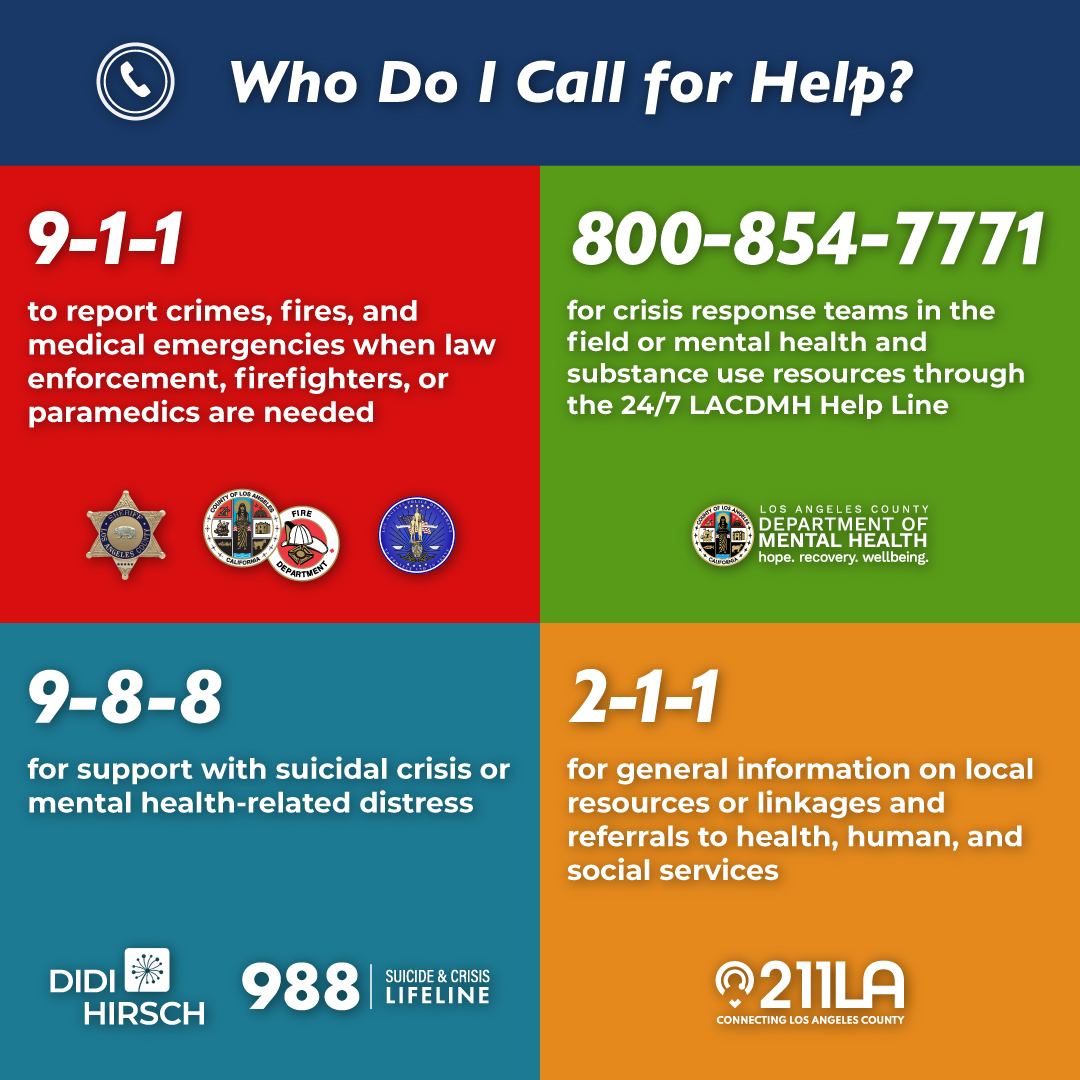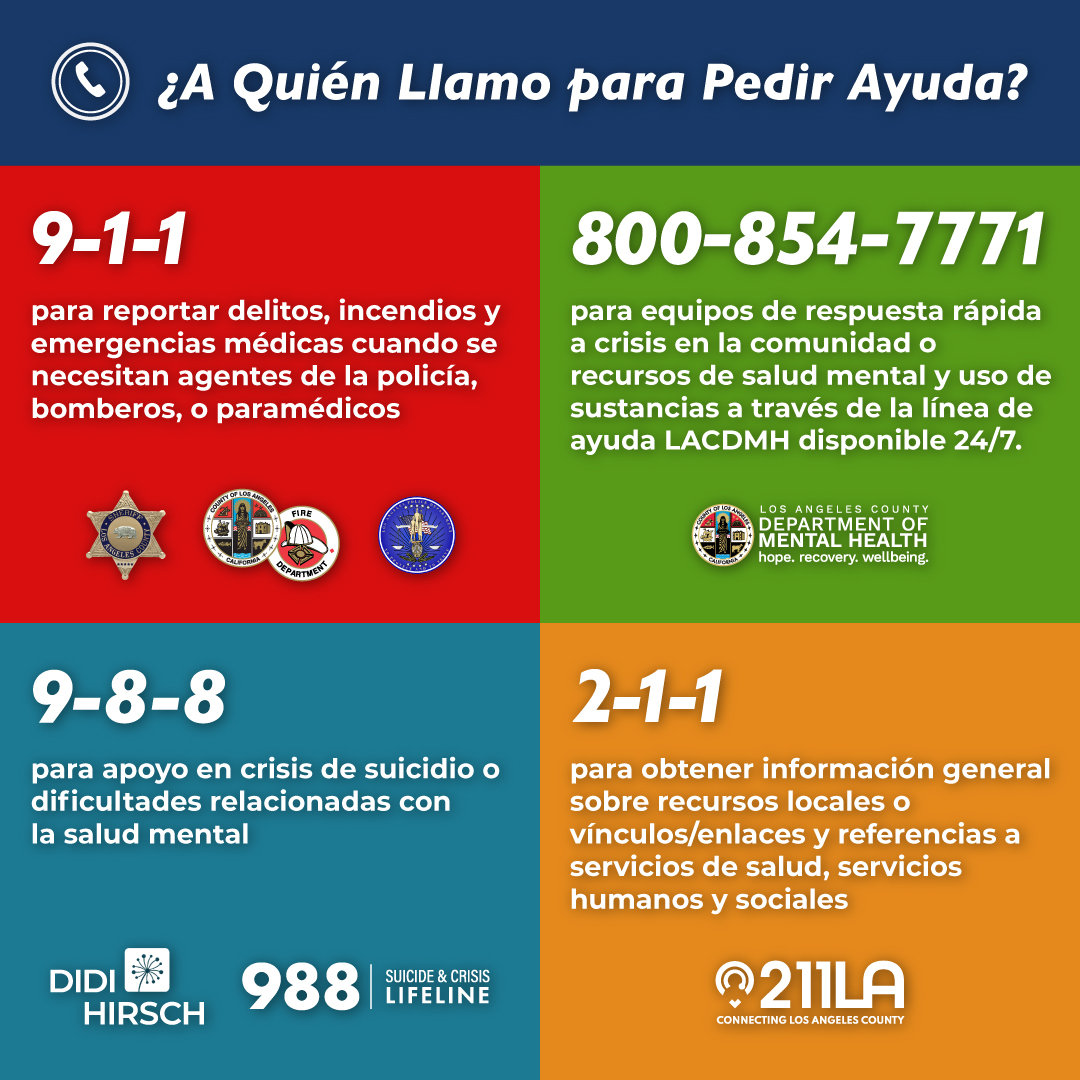
Written by: Gilbert Zavala
As we observe Suicide Prevention Month this September, it's vital to understand the various resources available for those in need of immediate help or ongoing support. Knowing when and how to use these resources can significantly impact the effectiveness of the response during a mental health crisis.
In response to the need for clearer guidance on emergency and support services, the Los Angeles County Department of Mental Health has introduced the Who Do I Call for Help? Campaign. This initiative, developed in collaboration with the Los Angeles County Sheriff’s Department, LAPD, LA County Fire Department, Didi Hirsch Mental Health Services, the 988 Suicide & Crisis Lifeline, and 211 LA, aims to enhance public understanding of the roles and services provided by different support systems:
911: For life-threatening emergencies requiring immediate action, call 911. This line connects individuals with emergency dispatchers who can send law enforcement, paramedics, or firefighters. Whether someone is at risk of self-harm or posing a threat to others, 911 is the go-to option for urgent intervention involving medical, mental health, or crime-related emergencies.
988: The 988 Suicide & Crisis Lifeline offers 24/7 support for individuals experiencing mental distress or suicidal thoughts. When you call 988, you reach trained counselors who provide immediate support and crisis intervention. This service operates around the clock to address urgent mental health needs and can collaborate with local emergency services if additional support is required.
211: Beyond immediate crisis intervention, 211 LA provides ongoing support and resources. We work closely with the 988 Lifeline to connect individuals with essential services such as counseling, support groups, and community-based assistance. If you need help finding mental health resources or follow-up support after a crisis, 211 is here to provide comprehensive information and referrals.
LACDMH Help Line (800-854-7771): For Los Angeles County residents seeking mental health resources and support, please call our 24/7 Help Line at (800) 854-7771. The LACDMH Help Line is the primary access point for behavioral health services, offering a range of support from our dedicated staff,
Local Resources for Suicide Prevention in Los Angeles County:
- Didi Hirsch Mental Health Services: Provides crisis support and mental health services, including the 24/7 Crisis Line. For immediate help, call 1-877-7-CRISIS (1-877-727-4747) or visit didihirsch.org.
- Los Angeles County Department of Mental Health (DMH): Offers a range of mental health services, including crisis intervention and support. The DMH Help Line, which can be reached at 800-854-7771, provides information and access to crisis response teams in LA County.
- LA LGBT Center: This center offers mental health services, including crisis intervention and support specifically for LGBTQ+ individuals. Contact the Center at 1-800-OUT-HELP (1-800-688-4357) or visit lalgbtcenter.org.
- Asian American Drug Abuse Program (AADAP): Offers mental health services and crisis intervention, with a focus on the Asian American community. Contact AADAP at 323-298-4987 or visit aadapinc.org.
- The Trevor Project: A vital resource for LGBTQ+ youth in crisis, offering 24/7 crisis intervention and suicide prevention services through phone, text, and chat. Reach out to The Trevor Project at 1-866-488-7386 or visit thetrevorproject.org.
- Trans Lifeline: Dedicated to the well-being of transgender individuals, Trans Lifeline provides peer support and crisis intervention. For confidential support, call 1-877-565-8860 or visit translifeline.org.
By effectively leveraging these resources, we can ensure that individuals in crisis receive the appropriate help and support they need.
For more information and to access these resources, visit 211la.org or call 211.
Together, we can make a difference in suicide prevention and mental health support.







